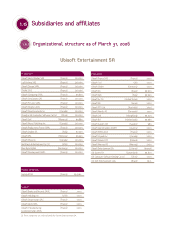Ubisoft 2005 Annual Report Download - page 44
Download and view the complete annual report
Please find page 44 of the 2005 Ubisoft annual report below. You can navigate through the pages in the report by either clicking on the pages listed below, or by using the keyword search tool below to find specific information within the annual report.
further by harnessing the energy of all its employees in
support of a single campaign: “Youth and Culture
Solidarity”.
Ubisoft decided to create a special framework for its phi-
lanthropic efforts, within which all employees could play a
role, in keeping with its values and identity. A framework
in which each of its entities and employees would be able to
take a high degree of initiative and make a personal contri-
bution. Through this campaign, Ubisoft has pledged to help
underprivileged and ill young people (children, adoles-
cents and young adults) enjoy greater access to games and
entertainment, creativity, education, arts and culture by
introducing its own initiatives and by supporting relevant
programs and players (associations, foundations and insti-
tutions). In this way, Ubisoft wishes to assert itself as a
civic-minded company that gives meaning to profitability
and to strengthen its commitment in terms of social
responsibility.
In addition to implementing this common philanthropic
policy in all its subsidiaries, Ubisoft has spearheaded seve-
ral other philanthropic campaigns around the world.
Ubisoft has made donations to a number of associations
(UNICEF, Centraide in Quebec), has supported charity
campaigns (Nite to Unite and Family Giving Tree in the
United States, IT-Cup in France) and has continued to
coordinate “leisure” days at children’s hospitals in France.
The company publishes and distributes video games, but
does not manufacture them. It has a very low impact on the
environment, whether in terms of air, water, soil, noise or
odor pollution. The principal manufacturing facilities of
Ubisoft’s suppliers and assemblers are ISO 9001 certified
and therefore comply with ISO 9001 norms regarding
safety and the environment. One facility is even certified
compliant with the 14001 environmental standard.
In France, Ubisoft contributes to the eco-packaging tax
based on each package (listed by category: paper, card-
board or plastic) sold on the French market. Ubisoft actively
recycles used computer equipment and electrical and elec-
tronics equipment as well as waste paper.
Recycling
The group is sensitive to the need for recycling. In order to
recycle its computer equipment in France, Ubisoft contrac-
ted with a company that specializes in the processing of
electrical and electronic waste and the recovery of compu-
ter monitors to salvage, disassemble and recycle used
equipment. To ensure compliance with current laws regar-
ding waste reduction and materials recovery, the company
“de-manufactures” equipment in order to sort, separate
and isolate its components and extract their value. This
process can be used to isolate toxic materials so they can
be packaged and routed to appropriate treatment
facilities.
During the year under review, Ubisoft’s French subsidia-
ries recycled more than 10 tons of equipment. Foreign
subsidiaries, such as those in Germany, the USA and Italy,
have also made efforts to recycle their computer equip-
ment or, as in the case of Japan, to contract with compa-
nies that specialize in the demolition of such equipment.
In general, the Ubisoft group is working to combat waste by
donating computer equipment to charitable organizations
or selling it to wholesalers or employees instead of discar-
ding it. The subsidiaries in Australia, Canada, China, Spain,
Morocco and Switzerland have taken this approach. Our
Ubisoft Divertissements Inc subsidiary gives some of its
used equipment to a social services company that works in
the IT field and helps troubled young adults enter the
workforce.
For the most part, cartridges and toner are returned to the
suppliers.
With regard to the recycling of paper products, several
subsidiaries, such as those in Germany, Korea, Italy,
Switzerland and United Kingdom, work with municipal or
government programs to recycle their paper through
selective sorting or collection areas, while others, inclu-
ding those in Canada, Australia, the US (cartons, boxes)
and France, rely on specialized outside firms under a pro-
gram launched in May 2005.
A work group mindful of the issue of environmental pro-
tection, called RECYCLONS! (LET’S RECYCLE!), was also
created in 2004. Its goal is to promote recycling at
Ubisoft’s French subsidiaries through the recycling of
paper products, the purchase of recycled paper for prin-
ters and copiers, the distribution of non-disposable plastic
cups and the inclusion of recycled office supplies in the
standard catalog provided to group subsidiaries in France.
In Germany, Ubisoft holds a “Green License” in connection
with the EU directive on packing supplies.
Destruction
of non-marketable
products
Each subsidiary is directly responsible for disposing of
inventories at distribution platforms. During the fiscal
year, Ubisoft destroyed 75 tons of non-marketable pro-
ducts by means of crushing or compacting, in a process
subject to monitoring by official bodies, and then delivered
the waste to outside firms to be burned (in Japan), buried
(in Italy) or recycled (in the US, Britain, Denmark,
Germany and France). In France, products are destroyed
1.5.1
1.5.2
Environmental data
1.5
























